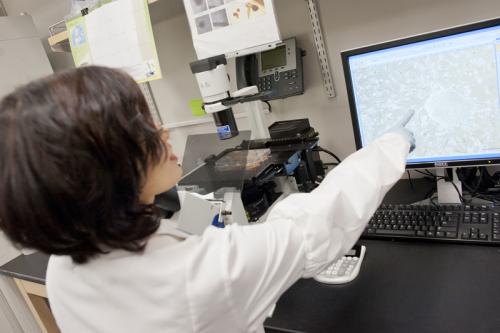
Two UCLA scientists receive CIRM Discovery Grants for stem cell research
Two researchers from UCLA’s Eli and Edythe Broad Center of Regenerative Medicine and Stem Cell Research have received Quest Discovery Program awards totaling approximately $2.7 million from the California Institute for Regenerative Medicine, the state stem cell agency.
Dr. Gay Crooks, Co-director of the UCLA Broad Stem Cell Research Center and a professor of pathology and laboratory medicine, pediatrics and orthopedic surgery, and Dr. Caroline Kuo, assistant clinical professor of pediatrics in the division of allergy, immunology, and rheumatology each received Quest Discovery awards that were announced at a meeting of the Independent Citizens Oversight Committee, CIRM’s governing body, in San Francisco, California on June 29, 2017.
The Quest Discovery Program was established to promote the discovery of promising novel stem cell-based technologies that will be ready for translational studies within two years.
Dr. Kuo’s award of $1,665,908 will support her work to develop a stem cell gene therapy to treat X-linked hyper-IgM syndrome, an immune disorder that occurs almost exclusively in males and is associated with abnormal levels of proteins called antibodies, which protect the body against infection. Dr. Kuo already serves as chair of a CIRM-funded clinical trial of gene therapy to treat X-linked chronic granulomatous disease, an immunodeficiency disorder commonly referred to as X-linked CGD.
Dr. Crooks’ $1,062,076 award will support her research into the technology development of a cell immunotherapy to treat cancer. In a preclinical study, Crooks created an artificial thymus capable of producing human T cells, the white blood cells that fight against disease-causing intruders in the body. She and her team are now seeking to use the artificial thymus organoid with pluripotent stem cells, which could produce a consistent supply of cancer-fighting T cells for patients in need of immediate life-saving treatment. CIRM called Crooks’ proposal a “promising novel technology with potential for great impact to patients.”